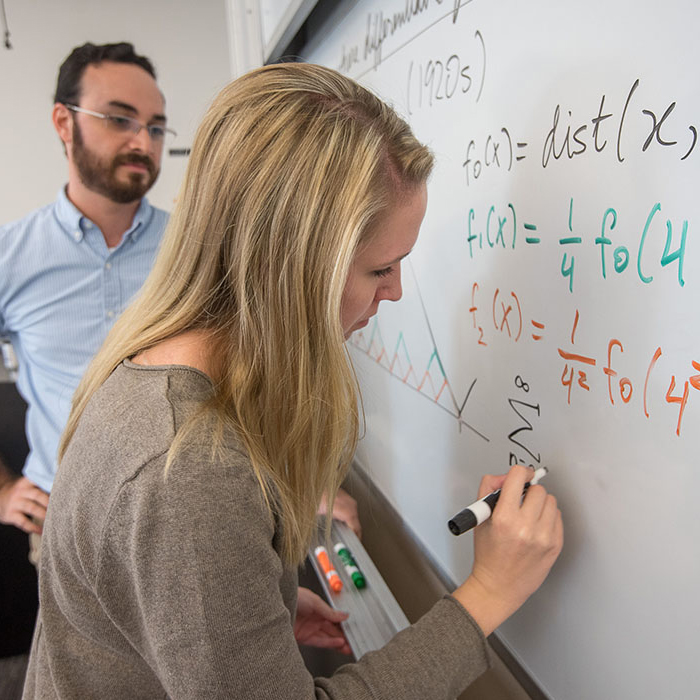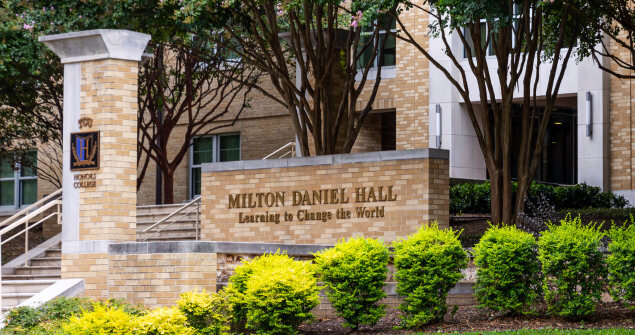Mathematics
You’ll master the language and methods of mathematics to solve problems in a variety of disciplines, opening up a wide range of opportunities after graduation.

Mathematics is the language and “queen” of the sciences, essential to advancing knowledge across every field.
Employers value the analytical skills that a math degree demonstrates, and a degree in mathematics from TCU will equip you to pursue almost any career, whether it be in finance, high tech, education or even law or medicine.
The Bachelor of Arts is our liberal arts degree, ideal if you’re seeking a career in mathematical or non-mathematical industries, including as an elementary or secondary math teacher. Other avenues include applying for TCU’s Master of Business Administration (MBA) program or Master of Arts in Teaching (MAT) program.
The Bachelor of Science is a more demanding degree, a good fit if you’re planning to go on to graduate school in mathematics and related fields, and for anyone seeking a more challenging mathematical experience.
If you’re interested in a career in insurance, risk analysis, pension management or financial planning, a concentration in actuarial science is also available. It can be combined with either the B.A. or the B.S. in mathematics.
Contact
- mathematics@tcu.edu
817-257-7335
Programs Offered
Sample Courses
- Calculus
- Discrete Mathematics I
- Intro to Mathematical Proof
- Real Analysis
View Courses & Degree Requirements

Core Curriculum
Your success is at our Core. TCU’s Core Curriculum prepares you to live and work in today’s ever-evolving diverse and global society. It encourages you to be intellectually curious and ask big questions about the world and your place in it.
Special Admission Requirements
There are no special admissions requirements for this program.
Our Faculty
You’ll learn from outstanding and award-winning faculty with doctoral degrees from Berkeley, Chicago, Harvard, Michigan, Princeton, Rice and other top-rated universities.
What Sets Us Apart
Teacher-Scholars — TCU’s teacher-scholar model means professors are both teachers and researchers — often with involvement of both undergraduate and graduate students. When your teachers are involved scholars themselves, everyone benefits.
Interdisciplinary Focus — At TCU, there’s a shared willingness by faculty to collaborate across disciplines in teaching and research. Our goal is for students to build on their new knowledge, making valuable connections between concepts and ideas from different areas of study. This motivates our students to be more creative in their lifelong learning and enhances the critical thinking skills needed for problem solving in today’s world.
Global Emphasis — International awareness and cross-cultural understanding are critical to TCU’s mission. Our faculty members are committed to empowering students to broaden their perspectives while addressing the world’s problems. TCU’s international programs inspire, enlighten and prepare Horned Frogs to make positive change for the greater good.
Career Prospects
In a rapidly changing global economy, the outlook for mathematicians is among the
brightest of all areas of study. Employment in math-related areas is projected to
grow 28 percent by 2026, faster than the average for all occupations, and will result
in more than 50,000 new jobs nationwide. As the analysis of “big data” rises in importance,
so does the demand for professionals with math degrees.
TCU math majors have gone on to jobs in every sector of the economy, including these
top employers who have hired our graduates:
- JPMorgan Chase
- ExxonMobil
- Microsoft
- AIG
- Cigna
- Teach for America
- Lockheed Martin
- Deloitte
In addition, our students have gone to graduate schools at some of the best universities in the country:
- Mathematics, Columbia University
- Statistics, Ohio State University
- Public Health/Biostatistics, Washington University
- Computational Genomics, UNLV
- Data Analytics, Indiana University
- Economics, University of Texas at Austin
- Law, University of Tulsa
Related Academic Programs

John V. Roach Honors College
Exceed your own expectations. Incoming and current undergraduate students of every major may apply. Unique classes are offered which connects students with a varied curriculum that is stimulating, supportive and cross-disciplinary.